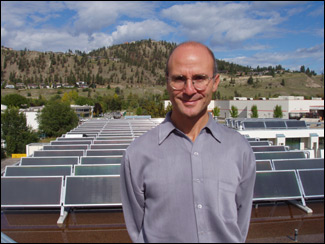There could be 50 companies in the valley which may become part of the alliance, including those involved in geothermal energy, solar technology, LED lighting and wind power.
At present, there are about 20 companies involved in formation of the alliance.
It’s certainly good news that green technology is finally getting it’s proper recognition, and there’s a great opportunity for both the economic development functions in the valley and this new alliance to step out of the box and apply real “eco” principles to economic targets.
The group has told the public that “an “eco-village” that is so green it would put Kelowna on the map”, is in the works and is just one of the potential projects that the new alliance could deliver.
However, I would suggest an eco-village would be more like “taking Kelowna off the map” and making it more in keeping with sustainable objectives that would find our cities in a small footprint within our natural surroundings rather than a large boot print driven by the tunnel vision that leads back to double digit growth with no boundaries to be found.
Directors are David Mayes, the chairman of the group who owns Complete Home Energy Ltd.; Angela Reid, president of Tigress Ventures; and Barry Milner, marketing director for GeoTility Systems Corporation.
“The Okanagan should be an area that does everything green, yet many residential and business property owners aren’t aware of companies in the valley that offer greener options,” said Milner.
This announcement from here in the Okanagan ran parallel with the U.S. Conference of Mayors' Climate Protection Summit held in Seattle this past week.
The shift to a green economy is the biggest economic opportunity facing the United States since the military buildup to World War Two, former President Bill Clinton told summit delegates.
Clinton said initiatives to combat global warming, such as the retrofit of old buildings and switching to more fuel-efficient cars, would create jobs and boost wages.
"In my view for the United States, it is the greatest economic opportunity we've had since we mobilized for World War Two," Clinton said. "If we do it right, it will produce job gains and income gains substantially greater than the 1990s."
Reuters reported that Clinton spoke to a group of U.S. mayors who have agreed to meet the goals of the Kyoto Protocol, the international agreement for fighting climate change.
During the speech, the former president said the Clinton Climate Initiative would extend its purchasing consortium of energy-efficient and clean-energy products to 1,100 U.S. cities to get volume discounts for items like green vehicles and alternative energy technologies.
The purchasing consortium was set up for a group of some of the world's 40 largest cities, including New York and London.
Cities account for 2 percent of the world's landmass, but produce 75 percent of the world's carbon emissions, according to Clinton.
Most scientists link greenhouse gases, such as carbon dioxide emitted from the burning of fossil fuels, to global warming that could lead to heat waves, stronger storms and flooding from rising sea levels.
So the Okanagan’s in good company with trying to build an initiative to combat climate change through the development of a new kind of industry.
But we could push the envelope even more if we really wanted.
In the early 1970’s at the root of the first green movement it was believed that the way to build a sustainable human society was through “ecodevelopment” which was a term first used internationally by the United Nations Environmental Program.
Ecodevelopment considered that any development must first consider the basic needs of all people before it pays attention to the wants of the privileged sectors of society.
It also directed development to support self-reliance, or the ability for a community to survive on its own resources. Both these primary targets must also be achieved without disturbing the ecological support that surrounds us and of which our community depends.
As a term, ecodevelopmnet has been lost in a transition of terms as it gave way to the term sustainable development, which we seek to include in all of our planning today.
So terminology aside, if our efforts to combat climate change and building greener industry is setting new economic goals, let’s set them within the framework of ecodevelopment.
Setting goals like housing the homeless, delivery of community-based healthcare, better quality of life for an ageing population, social equality and food self-sufficiency could all be fed into a matrix that measures our success as we develop a greener economy.
It means a change of attitude and a change in how we approach planning and problem-solving.
But that extra effort would be worth it
(30)
Don Elzer writes and comments about travel, current affairs and the natural world. He is the Director of the Wildcraft Forest Ecomuseum and is the editor of The Monster Guide which can be found at www.themonsterguide.com
He can also be reached by email at: treks@uniserve.com



